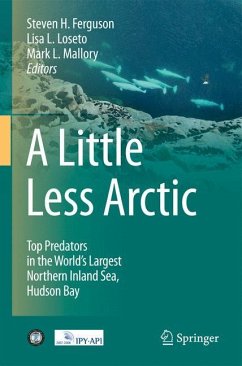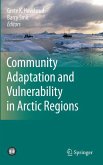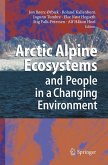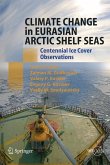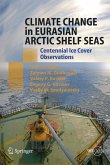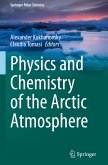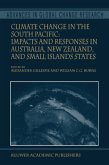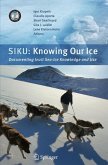In Arctic Canada, Hudson Bay is a site of great exploration history, aboriginal culture, and a vast marine wilderness supporting large populations of marine mammals and birds. These include some of the most iconic Arctic animals like beluga, narwhal, bowhead whales, and polar bears. Due to the challenges of conducting field research in this region, some of the mysteries of where these animals move, and how they are able to survive in such seemingly inhospitable, ice-choked habitats are just now being unlocked. For example, are polar bears being replaced by killer whales? This new information could not be more salient, as the Hudson Bay Region is undergoing rapid environmental change due to global warming, as well as increased pressures from industrial development interests. A Little Less Arctic brings together some of the world's leading Arctic scientists to present the current state of knowledge on the physical and biological characteristics of Hudson Bay.
Hinweis: Dieser Artikel kann nur an eine deutsche Lieferadresse ausgeliefert werden.
Hinweis: Dieser Artikel kann nur an eine deutsche Lieferadresse ausgeliefert werden.
From the reviews:
"Northern Canada's Hudson Bay stretches north into Arctic waters where climate change is proceeding most rapidly. This 14-chapter work covers the physical environment (sea ice), food chain (capelin), marine mammals (beluga, narwhal, polar bear, orca, bowhead, ringed seal, walrus), and seabirds. Climate change and sea ice change are a central theme throughout. ... Extensive references for each chapter; well illustrated. Summing Up: Recommended. Academic and professional collections, all levels." (J. Burger, Choice, Vol. 48 (6), February, 2011)
"A Little Less Arctic: Top Predators in the World's Largest Northern Inland Sea is an edited compendium of the state of various predators (e.g., killer whales, polar bears) in the Hudson Bay Complex ... . By providing a comprehensive overview of the current developments transpiring in the HBC, the book does provide senior undergraduates, graduate students and other individuals interested in this area with a good overview of the current ecological changes in the HBC." (Raynald Harvey Lemelin, Human Ecology, Vol. 39, 2011)
"This book is a diverse compendium of work from a multitude of scientists, examining various predatory species in the Arctic versus the effects of climate change and the history and projected future of the Hudson Bay. ... I very much enjoyed the papers presented in this book ... . recommend this book to anyone looking to learn about the current issues facing this unique setting, the flora and fauna contained therein, and the efforts of dedicated scientists to unravel the mysteries of a changing habitat." (Mike Pool, Aquatic Mammals, Vol. 39 (1), 2013)
"Northern Canada's Hudson Bay stretches north into Arctic waters where climate change is proceeding most rapidly. This 14-chapter work covers the physical environment (sea ice), food chain (capelin), marine mammals (beluga, narwhal, polar bear, orca, bowhead, ringed seal, walrus), and seabirds. Climate change and sea ice change are a central theme throughout. ... Extensive references for each chapter; well illustrated. Summing Up: Recommended. Academic and professional collections, all levels." (J. Burger, Choice, Vol. 48 (6), February, 2011)
"A Little Less Arctic: Top Predators in the World's Largest Northern Inland Sea is an edited compendium of the state of various predators (e.g., killer whales, polar bears) in the Hudson Bay Complex ... . By providing a comprehensive overview of the current developments transpiring in the HBC, the book does provide senior undergraduates, graduate students and other individuals interested in this area with a good overview of the current ecological changes in the HBC." (Raynald Harvey Lemelin, Human Ecology, Vol. 39, 2011)
"This book is a diverse compendium of work from a multitude of scientists, examining various predatory species in the Arctic versus the effects of climate change and the history and projected future of the Hudson Bay. ... I very much enjoyed the papers presented in this book ... . recommend this book to anyone looking to learn about the current issues facing this unique setting, the flora and fauna contained therein, and the efforts of dedicated scientists to unravel the mysteries of a changing habitat." (Mike Pool, Aquatic Mammals, Vol. 39 (1), 2013)

